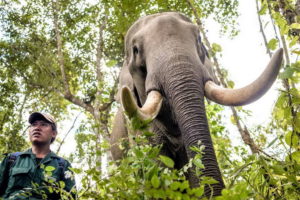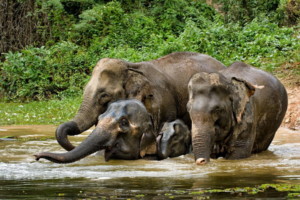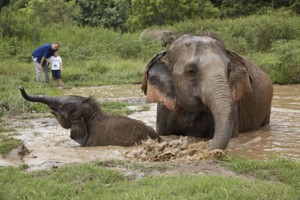Thailand’s tourism elephants lose when pragmatism gives way to politics, ideology
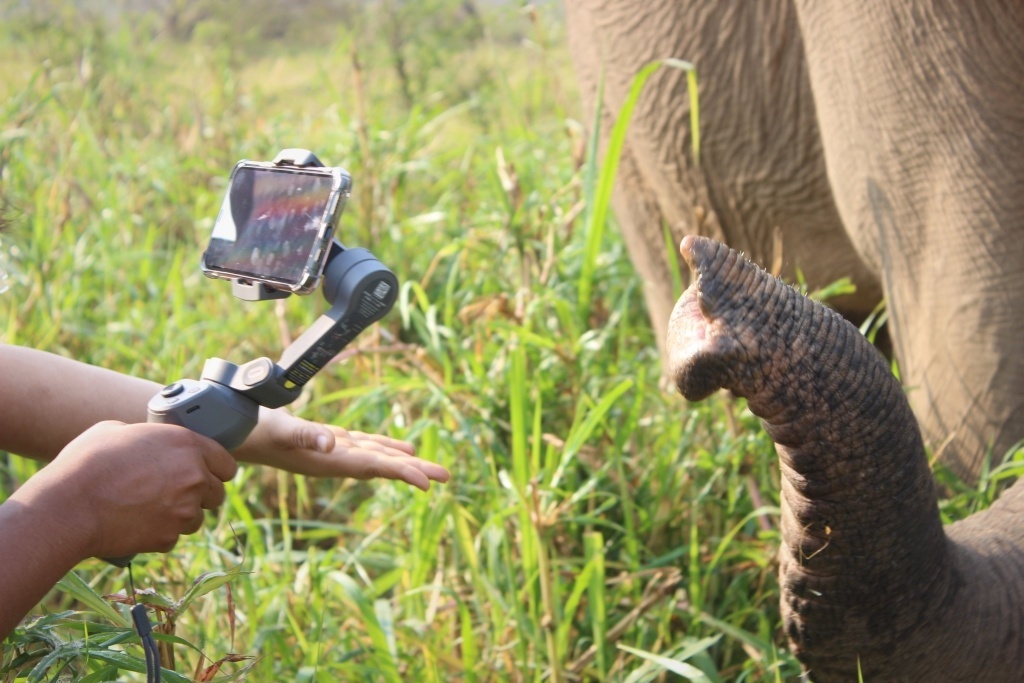
The best hope for Thailand’s unemployed tourism elephants now are livestreams and the generosity of donors. As travel resumes, elephant expert John Roberts fears that local politics and activist ideology will continue to be a barrier to optimal outcomes.
It’s a “Good Tourism” Insight.
It is always foolish to gaze into a crystal ball and try to predict what will happen in the future but that was exactly what I attempted back in 2017 when I penned “Elephant tourism: The harms of received wisdom”. I imagined what would happen to Thailand’s captive elephants if conscientious travellers boycotted their venues.
Thanks to COVID-19 we have had a chance to see what happens to captive elephants when international tourism grinds to a halt. At writing, international tourism has disappeared from Thailand for some 14 months. It is worth looking closely at the current situation because even though international tourism will surely resume, it will be a very long time, if ever, until it looks like it did before the pandemic.
Also see Hollis Burbank-Hammarlund’s news article from May 2020
“Veterinarians seek emergency funds for unemployed elephants”
‘If ever’ because activist pressure in some source markets is mounting. For example, the Association of British Travel Agents has, since the onset of COVID-19, released guidelines suggesting that all elephant activities must take place with a barrier between elephant and tourist. Furthermore, the UK Government is said to be considering a new law which some activists hope will make it illegal for British travel agents to advertise (and sell?) elephant activities. (One hopes that the UK Parliament will take a consultative, science- and community-based approach, and that any new law will target improvements rather than harmful, emotion-fuelled boycotts.)
Zero inbound tourism hurts Thailand’s elephants
So what is the situation in 2021? Are captive elephants better or worse off after 14 months without any international tourism?
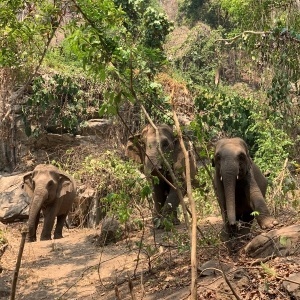
‘Worse off’ is the unanimous reply from people on the ground, including:
- Camps with international management who are running ever-more-desperate online fundraising programmes;
- Government and donor-funded vets who are having to treat more and more elephants with gastrointestinal problems and malnutrition;
- Campaigns that help elephants not represented internationally, such as the Thai Elephant Alliance and the Southern Thai Elephant Foundation;
- Mahouts and owners who have had to return home, take second jobs to feed their elephants, open YouTube or Facebook channels to beg for food or, in very rare cases, abandon their elephants to almost starve;
Also see Hollis Burbank-Hammarlund’s “GT” Insight
“Tourism in crisis: A Myanmar elephant camp pivots to plan B”
Furthermore, the village of Ban Ta Klang in the northeastern province of Surin, which was already struggling to feed 300 elephants pre-pandemic, has received 300 more individuals to take care of as elephant camps in tourist areas have shuttered.
In the mountainous north, elephants have been kicked out of camps and returned to community forests that are much diminished by the recent arrival of industrial agriculture. An incident in the early wet season (April) saw three elephants killed and three others injured by a single falling tree.
Political resistance to pragmatic change hurts Thailand’s elephant
Has a loss of tourism income forced a re-think by Thailand’s elephant people? Is the Government considering a policy to reduce the number of captive elephants?
The answers, so far, are ‘no’ and ‘no’.
Elephants are still being bred in captivity “for future mahouts”, one mahout I spoke to said. People are still buying and selling elephants albeit at a ‘reduced’ price of around USD 20,000 per elephant rather than the pre-pandemic price of USD 60,000. (As recently as 2005, even USD 20,000 would have been considered very expensive for an elephant. The price was driven up by the ‘buy to rescue’ trend. I believe the price must drop much lower before elephants are once again considered for their intrinsic priceless value.)
Also see Anabel Lopez-Perez’ insightful article from Laos
“Mahouts matter: The Elephant Conservation Center’s essential workers”
Given that every elephant requires at least USD 20 worth of fodder per day plus a mahout’s living wage and veterinary care, those investing enough in an elephant to buy a second-hand Mercedes must assume that the heady boom times will return.
More worrying still is the stiff opposition, mainly from owners of large elephant camps, to an attempt by the Thai Government to introduce very basic mandatory welfare standards. One can expect similar opposition to the draft Elephant Act, which would place basic regulations on a currently unregulated industry, lifestyle, and tradition — not all tourism-related — including licensing for mahouts, elephant camp owners, and elephant traders. (Successive waves of COVID-19 have stalled public and industry consultation on this draft legislation.)
Entrenched positions hurt Thailand’s elephants
It is clear that captive elephants are now caught in a holding pattern that is spiralling lower. Despite massive online efforts, the money raised to look after them is insufficient. This has resulted in an overall decline in elephants’ health and welfare with many, particularly in Surin, now on short chains 24 hours a day with no exercise or enrichment.
It is equally clear that the views of both the elephant people and those who would seek to blame tourism for the elephants’ ills remain entrenched. It seems most on both sides are waiting for a return to ‘normal’ to either reopen their tourism businesses or restart their activist fundraising campaigns to continue as before.
This is a shame. While the pandemic has shown us what elephants’ lives without tourism look like, before the pandemic there was cause for optimism.
Also see David Gillbanks’ news article from March 2019
“Elephants are smart. What if tourism jobs were good for them?”
For example, some elephant and camp owners — more than I expected — had begun to design business models with activists’ concerns in mind. However, as peer-reviewed studies were starting to show — and as I expected — they did not necessarily improve elephant well-being. Yet the fact is that many elephant tourism stakeholders demonstrated that they were amenable to change. I am certain that they could be persuaded to continually improve their practices with evidence-based advice. I’ve spoken with some of them and know vets who are in touch with many more.
Furthermore, before the pandemic, independent groups had begun auditing elephant camps of all business models to internationally-recognised welfare standards based on peer-reviewed science and veterinary experience. Audit results when correlated with practices gave local vets, Government departments, and the auditing organisations themselves useful insights. They were better able to advise camp owners on specific actions they could take to improve the welfare of elephants under their care.
The way forward
Ultimately, if Thailand and the rest of the world want to reduce captive elephants’ dependence on tourism, the only effective way forward will be a coherent plan to reduce the number of elephants in captivity. The plan will require strictly-enforced laws that have the buy-in of the elephant community.
Fourteen months since any elephant tourism operation received, in person, an international tourist, the continued resistance by the industry to any perceived Government interference suggests that we are a long way from achieving this. It will take more than the prolonged disappearance of tourists or the banning of advertising or sales from one or two inbound markets.
Also see Daniel Turner’s “GT” Insight
“As we build back, is sustainable tourism enough to regenerate nature?”
On a more positive note, after 14 months of no tourism, we can see which operations looked after their elephants through the tough times. And we can see those that flew flags of compassion and ‘ethics’ during the good times only to let their elephants and mahouts fend for themselves when the going got rough.
As international tourism resumes, perhaps the best way for global travel & tourism stakeholders to support Thailand’s elephants is to ask prospective partners how they helped elephants through the pandemic, and to which internationally-recognised, science-based welfare standards they are independently audited.
Featured image (top of post): During COVID lockdowns, fundraising livestreams are the best hope for unemployed elephants in Thailand. Pic supplied by John Roberts.
What do you think? Share a short anecdote or comment below. Or write a deeper “GT” Insight. The “Good Tourism” Blog welcomes diversity of opinion and perspective about travel & tourism because travel & tourism is everyone’s business.
About the author
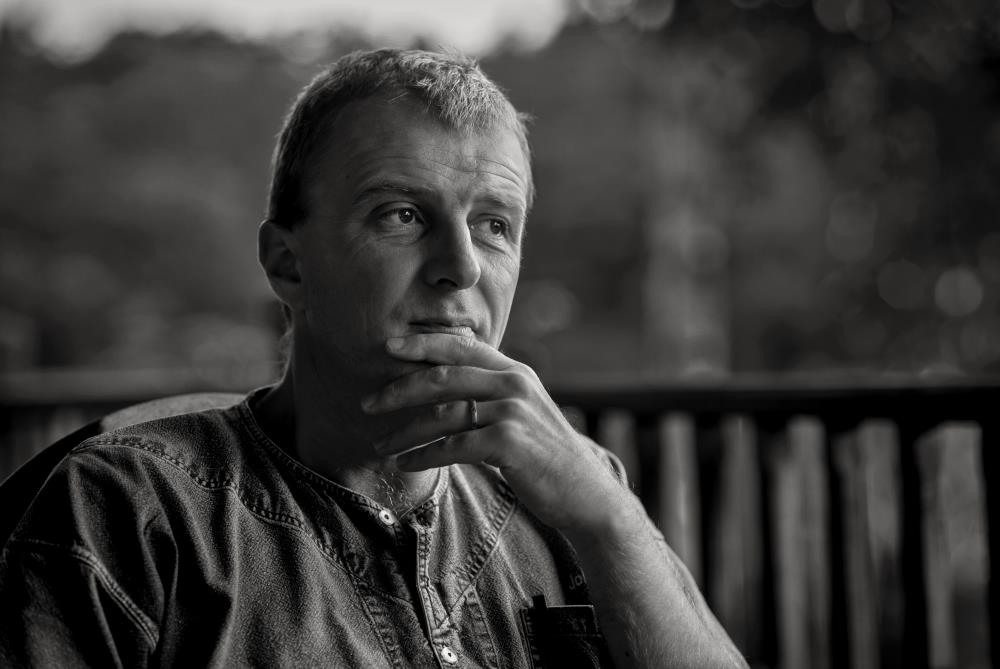
John Roberts saw his first captive elephant, Sham Shere Bahadur, on the lawn of Tiger Tops Jungle Lodge, Nepal, October 1, 1999. Despite being surrounded by many fascinating things in Chitwan National Park he was quickly fascinated by elephants, not only the creatures themselves but by the complex relationships with their mahouts.
Mr Roberts arrived in Thailand in 2003 and set up the award-winning Elephant Camp for Anantara Golden Triangle Elephant Camp & Resort, where he continues to develop guest activities that enhance the welfare of elephants.
He also established the Golden Triangle Asian Elephant Foundation (GTAEF) to initially bring street-begging young elephants back to their natural habitat. Now, as well as helping wild elephants stay wild by funding long term habitat conservation projects, GTAEF concentrates on helping mahouts and elephants adapt to the realities of modern life in Southeast Asia. Its Target Training Positive Reinforcement Workshops have reached more than 800 mahouts, vets, and managers responsible for thousands of elephants across eight range states. Through partnerships, GTAEF is providing veterinary care for elephants across Thailand by subsidising vet and vet nurse wages. In Ban Ta Klang — Southeast Asia’s most populous captive elephant site and home to the mahout tradition arguably most cut-off from it’s roots — GTAEF provides children with with full-time English-language training and conservation education.
John is a member of the IUCN SSC Asian Elephant Specialist Group and co-chair of the Asian Captive Elephant Working Group. Since the start of the COVID-19 pandemic John, his GTAEF team, and the elephants have livestreamed nearly daily via Facebook at GTAEF Helping Elephants and Instagram at @GTAEF_Thailand.


